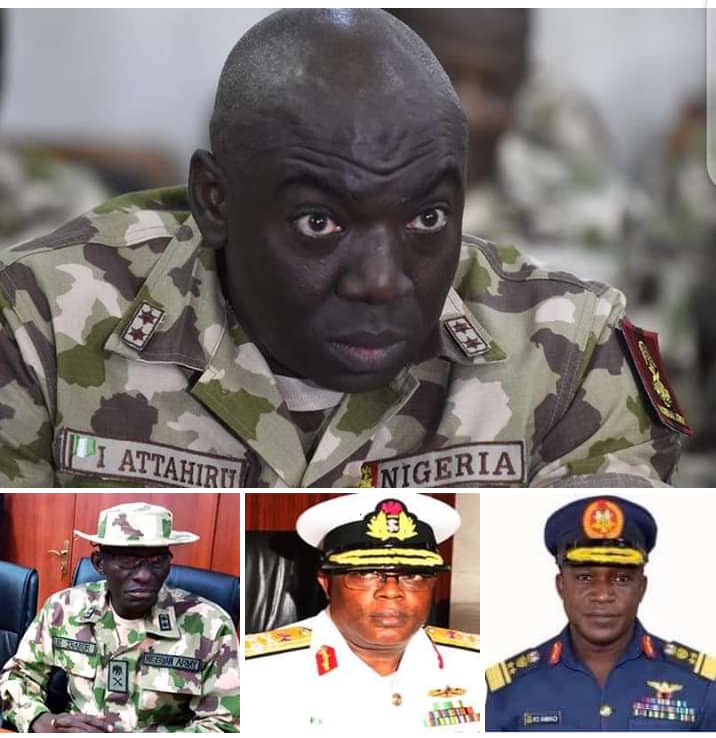
By KEMI KASUMU

“Top priorities for the new Service Chiefs should be improved inter-agency cooperation, smooth leadership command and control, boosting frontline troops’ morale and enhancement of the navy patrol in the fringes of the Lake Chad waters Baga.”
The notorious Shura Council members of Boko Haram splinter faction and self-proclaimed Islamic State West Africa Province (ISWAP) terrorists’ groups have appointed a new Amir – Abu Dawud – nom de guerre.
David Otto, Director of Counterterrorism and Organised Crime for the UK based Stepped -in-Step Out Ltd (SISO) and Swiss Geneva Centre for Security and Strategic Studies (GCASSS), revealed this in his latest report sent to The DEFENDER on Monday.
Otto’s reports, published in the past by this digital newspaper, had helped greatly in the prosecution of anti-terrorism war, particularly, in Nigeria as they told the war prosecutors about the plans and movements of the insurgents.
Impeccable sources, according to the security expert, confirmed that the little-known Abu Dawud replaced Amir Abba-Gana (AKA Ba Lawan).
The change of ISWAP leadership was triggered by a violent internal coup masterminded by discontented ISWAP unit commanders at Tumbun Kayowa, a remote camp in the Lake Chad Basin fringes considered as the de-facto headquarters of ISWAP.
The Mid-January 2021 ISWAP leadership change from Ba Lawan to Abu Dawud has been linked directly to a previously reported December 2020 bloodbath and mutiny in the same ISWAP Kayowa camp.
It was over the controversial process and selection criteria used in the then appointment of one Aliyu Chakkar as the new “governor of the Lake Chad Basin “under Ba Lawan’s leadership.
Recall that Aliyu Chakkar replaced the infamous Goni Maina, the ‘governor’ eliminated by Nigerian military’s bombardment on Sabon Tumbu.
Before Abu Dawud’s appointment, sources revealed that one Amir Goni Mustapha was temporarily appointed as Acting ISWAP leader, doubling as the Chief Imam of ISWAP for a short period while awaiting the final decision of the Shura council members.
Why was Amir Abba-Gana replaced?
Sources say the Shura Council blamed Abba Gana for losing leadership command, control, respect, and confidence of most of his loyalist top commanders and had become increasingly unpopular. He was equally found guilty of instigating the increasing and growing insurrection among fighters, regular bloodshed, and bringing dishonour within ISWAP.
The impact of military interventions
Other operational reasons cited by the Shura Council included the bad state of ISWAP jihadists’ leadership structure. They further alleged this led to an increase in desertions, failings in recruiting new fighters, and inability to hold territories.
Other reasons include massive loss of regions to offensives by the Nigerian military, the Chadian Army, the Nigérien forces and the regional Multi-national Joint Task Force (MNJTF) troops under his watch. The increasing merciless and coordinated land and air raids under joint “Operation TURA TA KAI BANGO, a subsidiary of Operation LAFIYA DOLE in the North East. The recorded massive success in eliminating and reducing several Boko Haram/ ISWAP terrorists’ capacities in the Sambisa forest; the Mandara mountains and fringes of the Lake Chad region. These operations have forced dozens of Boko Haram/ISWAP fighters and their families to flee across the Lake Chad basin region’s porous waterways.” David Otto reported.
Who is Abu Dawud, the ISWAP new leader?
Little is known of the new ISWAP leader. But sources say Abu Dawud, is in his 40s. He is a ruthless ISWAP Commander from that hailed from northern parts of Borno State, Nigeria.
He was chosen to lead one of the ISIS’s core most active jihadists’ group in the world after allegedly demonstrating ISWAP style combat capacity experience, including skills in planning, intelligence, and militant operations. In March 2020, Abu Dawud was reported to have led the unprecedented attack on a military formation in Boma village in the Lake Chad Basin’s Chadian peninsula.
In the episode, at least 92 Chadian soldiers were killed and 47 of them injured. It will be recalled that the attack led to Chad President Idriss Derby to launch one of the most effective counter-offensives against Boko Haram units on the shores of Lake Chad Basin, ‘Operation BOMA WRATH.’
Abu Dawud has spearheaded another hard target attack at the Niger Republic military reconnaissance outpost in Chetima Wangou, Diffa Region, killing eight persons.
Impact of ISWAP leadership Changes
There is yet no information on the fate of Ba Lawan, but his loyalist commanders will likely stand by him posing a severe intra-ISWAP threat to the new ISWAP leader.
It is expected that Abu Dawud would have immediately began planning to consolidate and lead operations by directing both soft civilian and hard military target attacks in the region.
However, reports indicate the new ISWAP leader has declared the start of a massive recruitment drive targeting young male adults in the Lake Chad region to replace its lost fighters. The backup plan is to kidnap unwilling targets into recruitment and indoctrination drives of the insurgents.
“The emergence of a new ISWAP leader coincides with the appointment of new Service Chiefs in Nigeria by President Muhammadu Buhari.
“The new Service Chiefs will be expected to continue a fierce and relentless coordinated joint operation against the Boko Haram and ISWAP terrorists’ group.
“Top priorities for the new Service Chiefs should be improved inter-agency cooperation, smooth leadership command and control, boosting frontline troops’ morale and enhancement of the navy patrol in the fringes of the Lake Chad waters Baga.
“Others should be winning the hearts and minds of the local population, strategic communications with local and international media platforms to counter jihadist propaganda; continue to promote human rights behaviour of frontline troops; regional collaboration with Cameroon, Niger Republic, and Chad by strengthening the Multi-National Joint Task Force (MNJTF) operations,” the counter-terrorism expert advised the military, urging the civilian population saying, “If you see something, say something.”








